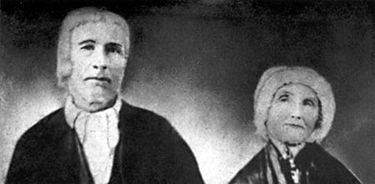Williamson Hawkins
Williamson Hawkins (born August 1790 in Edgefield County, South Carolina; died August 4, 1875 in Elyton) was a pioneer and plantation owner.
Hawkins was the son of Edward and Winnifred Hawkins. After a falling-out with his step-mother, he took to the frontier country. He married Elizabeth "Betsy" Nations in Tennessee around 1810. He was a private in John Doaks' Company of the 2nd Regiment, Williams' Tennessee Mounted Volunteers in the War of 1812. Like many of his fellow soldiers, he moved into newly-opened lands in Alabama, tending to some personal matters before setting off in May 1815.
Hawkins left his family in the company of a group of settlers from Rutherford County. He packed up a horse and drove a few head of cattle with him into Jones Valley, first settling with his compatriots in the vicinity of present-day Woodlawn. He raised a first crop and sold milk and butter to his less farsighted neighbors. After the harvest he retrieved Betsy and their two young children and began accumulating additional property closer to Jonesboro and Big Spring. In 1819, while riding near Elyton, he corralled a bear in a fenced yard and killed it with an ax.
As his crops flourished, Hawkins reinvested the dividends in land and slaves. He built a large residence near Village Creek and by 1860 his holdings totaled 3,000 acres. His 150 slaves produced 100 bales of cotton each year, along with corn and peaches. His $159,975 in claimed assets made him the richest man in the county and he continued to operate the plantation until the very end of the Civil War.
When Major Shipman of the 1st Wisconsin Regiment reached the Hawkins Plantation in March 1865 he found the intact plantation "extensive and prosperous", but described its owner as "cranky and insolent". During their encampment the Union soldiers availed themselves of the farm and its products, using the Hawkins Mill to grind corn and confiscating a keg of peach brandy. General Edward McCook used the house as his staff headquarters during the encampment.
After the war, Hawkins reported direct losses of over $16,600, not including the loss of slaves and the devaluation of his land. When approached by Truman Aldrich and Henry F. DeBardeleben on behalf of the Thomas Iron Company of Pennsylvania, he agreed to a price of $4 an acre for the sale of what became the Thomas Furnace plant in 1881.
In 1871 Hawkins donated a parcel of land in Elyton and commissioned a 484-pound bronze bell for St John's Episcopal Church, founded by his son Nathaniel and his wife and sister-in-law's family.
Williamson and Betsy Hawkins had nine children, David, Anne, Susan, James, Nathaniel, Eleanor, Samuel, Bayliss and Washington Andrew.
Hawkins died in 1875 and was buried on the family's land. His headstone was moved in 1970 to the Elyton Cemetery.
References
- Nabors, Sarah Elizabeth Hawkins (July 31, 1903) "The Hawkins Family of Jefferson County." typed manuscript located in the Special Collections at the Samford University Library
- Nabors, Lula Hawkins (n. d.) "Williamson Hawkins," and "Hawkins Family Papers." typed manuscripts in the Hill Ferguson Collection (3: 6; 47: 3-4) in the Birmingham Public Library Archives
- Atkins, Leah Rawls (1981) The Valley and the Hills: An Illustrated History of Birmingham and Jefferson County, Alabama. Birmingham: Birmingham-Jefferson Historical Society. ISBN 0897810317
- Bennett, James R. (2008) Historic Birmingham and Jefferson County: An Illustrated History. San Antonio, Texas: Birmingham-Jefferson Historical Society/Historical Publishing Network. ISBN 9781893619838
